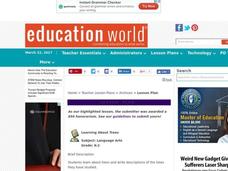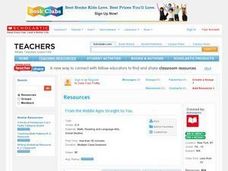Curated OER
What a Relief!
How are disasters addressed by the Federal Government? This New York Times lesson, based on the article "Disaster Aid: The Mix of Mercy and Politics," prompts middle schoolers to discuss the idea of using a disaster declaration as a...
Curated OER
Playing With Science
Young scientists investigate the scientific concepts and principles that help make common toys such as hula hoops, yo-yos, slinkies, and silly putty work. As a class, they read "Backyard Rocket Science, Served Wet" to get a look behind...
Curated OER
Can Scientists Discover a Limit to Discovery?
Is there anything left to discover? Evaluate opposing sides of the debate regarding whether or not there is a future for scientific discovery. Middle and high schoolers assess quotations from the articles included to evaluate claims and...
Curated OER
The Dropping of the Atomic Bomb at Hiroshima and Nagasaki
Take an in-depth look at the historical events in Hiroshima and Nagasaki in this 69-slide PowerPoint. Photos, facts, and transcripts are outlined in this presentation in order to answer the stated essential question in slide 2: "What...
National Endowment for the Humanities
Chronicling America: Uncovering a World at War
As part of a study of World War I, class members read newspaper articles from the time that urge American involvement, non-involvement, or neutrality. Using the provided worksheet, groups analyze the articles noting the central argument...
Curated OER
Noncombatancy and the Seventh day Adventist Church
Upper graders investigate how the Seventh Day Adventists are objectors to the practice of war. The lesson covers the Civil War and examines the church's position about the practice of war. The research extends to modern wars and learners...
Curated OER
Learning About Trees
After looking at pictures of trees, discussing tree growth, and identifying the parts of a tree, lead your class on a nature walk and have them collect samples and record their observations. They then work in pairs to polish the...
Curated OER
Human Body Series - Respiratory System
Elementary schoolers play a respiratory relay toss in order to take in the respiratory system! They also create their own question cards based on several kid-friendly online articles about breathing and the health of the lungs. They use...
Curated OER
Riding the Backchannel Wave
Increase student engagement and take your classroom discussion to new depths
K12 Reader
The Scientific Method
Introduce the scientific method with a reading comprehension activity. Have kids read a few paragraphs that describe the process of making a hypothesis, gathering evidence, and taking notes that will support the experiment.
Curated OER
New York State Testing Program: English Language Arts Book 2
Practice listening and writing skills with this resource. This is a test created by the New York State Testing Program. Learners listen to a passage called "Leonardo da Vinci's Mona Lisa" twice and write responses to the selection. They...
EngageNY
Researching about the Red Cross, Continued: Who Is the Red Cross and What Does This Multinational Organization Do?
Code red! Learners read an informational article about the Red Cross, discussing the gist of the text in small groups. On a three-column note catcher, pupils take notes to show how the Red Cross functions as a multinational aid...
Curated OER
All Americana
Fifth graders research American landmarks and symbols. In this United States history instructional activity, 5th graders create a KWL chart about the symbols of America and take notes during a PowerPoint presentation. Students complete...
Curated OER
From the Middle Ages Straight to You
Learners read a "letter" from Dr. Suess' Bartholomew Cubbins and note differences between their lives and Bartholomew's. They utilize prewriting strategies to draft a letter of response to Bartholomew.
Curated OER
The Gay '80s, '90s and '00s
After reading and discussing a news article from the New York Times regarding gay and lesbian issues of the last thirty years, students engage in several activities to explore current events. They create a timeline, either electronically...
K12 Reader
Summarize It!
A key reading comprehension skill is the ability to summarize. Here's a activity that not only explains how to summarize, but also explains why summarizing is important.
Other popular searches
- Teaching Note Taking Skills
- Note Taking Skills, Science
- Note Taking Skills Science
- Cornell Note Taking Skills
- Note Taking Skills Research
- Elementary Note Taking Skills
- College Note Taking Skills

















